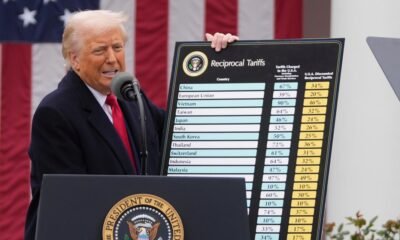Business
Trump Announces Immediate 25% Tariffs on Mexican and Canadian Imports, Urging Swift Action

WASHINGTON — President Donald Trump announced a significant escalation in trade tensions, revealing that 25% tariffs on imports from Mexico and Canada would take effect Tuesday. This move raised concerns over a potential trade war that could affect economic growth and fuel inflation.
“Tomorrow — tariffs 25% on Canada and 25% on Mexico. And that’ll start,” he stated in a press conference. According to Trump, the tariffs aim to compel both countries to strengthen their efforts against fentanyl trafficking and curb illegal immigration. Additionally, he seeks to address the trade imbalance and encourage U.S. manufacturing.
The announcement had an immediate effect on financial markets, with the S&P 500 index declining by 2% during Monday’s trading. Analysts suggest that these tariffs may pose risks to long-standing trade relationships and exacerbate inflationary pressures in the U.S. economy.
Despite these risks, the Trump administration stands firm that tariffs will ultimately bolster U.S. manufacturing and attract foreign investment. Commerce Secretary Howard Lutnick highlighted that semiconductor giant TSMC has expanded its investments in the U.S., partly due to impending tariffs.
In a previous move, Trump imposed a 10% tariff on Chinese imports, which is set to double to 20% on Tuesday. He had previously delayed this escalation, expecting concessions from Mexico and Canada, but now claims there is “no room left” for them to avoid the steep tariffs.
Canadian Foreign Minister Mélanie Joly responded to Trump’s announcement, stating, “If Trump is imposing tariffs, we are ready,” indicating that Canada has prepared tariffs on U.S. goods totaling $155 billion. She reiterated Canada’s commitment to diplomatic engagement despite the escalating tensions.
On the other hand, Mexico’s President Claudia Sheinbaum expressed uncertainty ahead of Trump’s announcement, affirming that Mexico would respond accordingly to the U.S. government’s decisions. Mexico has taken measures to address Trump’s concerns by deploying 10,000 National Guard troops to its border to combat drug trafficking and illegal immigration.
As the deadline for the tariff implementation approached, discussions around the specific rates remained uncertain. Lutnick described the situation as “fluid,” emphasizing that negotiations were ongoing.
Treasury Secretary Scott Bessent noted that Mexico had offered to implement a 20% tariff on imports from China, aiming to mitigate some of the trade pressure. He suggested that the burden of tariffs might not fall directly on U.S. consumers, as China might absorb the costs.
However, major corporations, including Ford and Walmart, have cautioned against the negative repercussions of tariffs on their operations. Research from the Peterson Institute for International Economics indicates that average American families could face price increases exceeding $1,000.
Eswar Prasad, a Cornell University economist, warned that the tariffs could disrupt businesses’ supply chains and operations, leading to inflationary impacts. While the stronger U.S. dollar may mitigate some cost increases, it could also diminish the competitiveness of American goods in international markets.
Furthermore, Trump plans to enforce “reciprocal” tariffs next month, aligning U.S. rates with those imposed by other countries. The president has already eliminated exemptions from previous tariffs on steel, aluminum, autos, computer chips, copper, and pharmaceuticals.


















